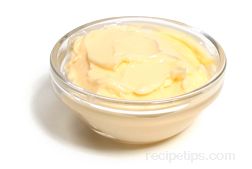 |
|
| An oil that is extracted from the seeds or nuts of vegetable plants, such as corn, soybeans, peanuts, safflower seeds, sunflower seeds, and rape seeds (used for canola oil), that is turned into a spreadable form of margarine to be used as a replacement for butter. Vegetable oil spreads are very mild in flavor, and can be heated to high temperatures. This type of spread has been created as a substitute for butters that contain more calories, saturated or unsaturated fats, and higher cholesterol levels. The package label on vegetable oil spreads states the percentage of vegetable oil in the product, as required by U.S. standards, which are to be less than 80% oil.
All vegetable oil spreads can be used as food toppings or flavorings on toast, bread, muffins, crackers, and other food products. However, when used for baking, the spreads that contain less than 50% oil should be applied to foods that already contain a significant amount of moisture, such as some pasta and cheese dishes. Less than 50% will not work well for baking and frying of foods. Spreads that contain 50% to 60% oil can be used for cooking a wider variety of foods and for sautéing. When the oil content exceeds 60%, the spread can be used for almost all recipes except those that require exact amounts of fat or for recipes requiring that certain moisture levels are achieved. |
|
|

